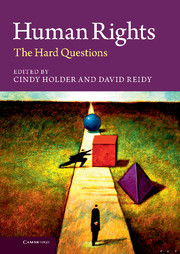Book contents
- Frontmatter
- Contents
- Figure
- List of table
- Notes on contributors
- Introduction
- Part I What are human rights?
- 1 Human rights and human nature
- 2 Universalism and particularism in human rights
- 3 Are human rights universal?
- Part II How do human rights relate to group rights and culture?
- Part III What do human rights require of the global economy?
- Part IV How do human rights relate to environmental policy?
- Part V Is there a human right to democracy?
- Part VI What are the limits of rights enforcement?
- Part VII Are human rights progressive?
- Index
- References
1 - Human rights and human nature
Published online by Cambridge University Press: 05 May 2013
- Frontmatter
- Contents
- Figure
- List of table
- Notes on contributors
- Introduction
- Part I What are human rights?
- 1 Human rights and human nature
- 2 Universalism and particularism in human rights
- 3 Are human rights universal?
- Part II How do human rights relate to group rights and culture?
- Part III What do human rights require of the global economy?
- Part IV How do human rights relate to environmental policy?
- Part V Is there a human right to democracy?
- Part VI What are the limits of rights enforcement?
- Part VII Are human rights progressive?
- Index
- References
Summary
Introduction
Whether a viable account of human rights requires an accompanying account of human nature is a hard question. The assumption made by proponents of the international human rights regime has usually been that an account of human nature is neither desirable in its own terms, nor necessary for the task of promoting human rights. I want to suggest that both elements of this assumption are now highly contestable and contested and that the international human rights regime is under considerable strain as a result. This chapter is devoted to examining why so many people have been reluctant to associate human rights with a theory of human nature, why this reluctance has now become counter-productive and why we should now be prepared to re-examine the issue.
To tell a familiar story very briefly, from relatively modest beginnings in 1948 the international human rights regime now purports to grant very extensive rights to individuals; however, this expansion has been accompanied by criticisms to the effect that the regime represents a specifically Western, and perhaps masculine, vision of the world (Alston et al. 2007; Bauer and Bell 1999; Cook 1994). In support of this regime, international criminal law has also developed at high speed in the post-1945 period, and especially post-1989 with the establishment of special Tribunals and, in 2002, of the International Criminal Court (ICC) (Cassese 2008, 2009; Peskin 2009; Schabas 2007). But again, the actions of these courts are criticized because the standards of justice they promote are widely regarded as reflecting Western values and interests.
- Type
- Chapter
- Information
- Human RightsThe Hard Questions, pp. 23 - 38Publisher: Cambridge University PressPrint publication year: 2013
References
- 17
- Cited by



